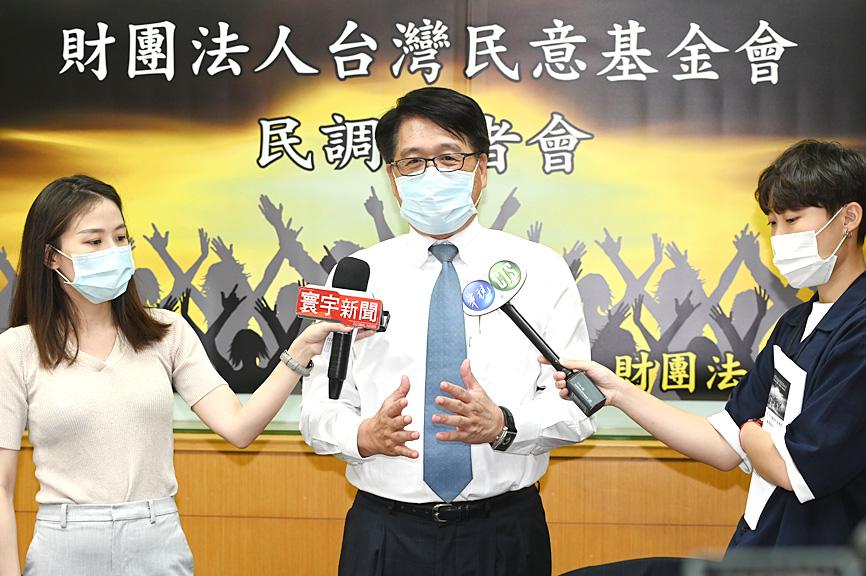Half of Taiwanese support independence, according to the results of a poll released yesterday by the Taiwanese Public Opinion Foundation, which also found that President Tsai Ing-wen’s (蔡英文) support rating fell by 7 percentage points.
Fifty percent of respondents supported independence, 25.7 percent supported maintaining the “status quo” and 11.8 percent supported unification, while 12.1 percent had no opinion, did not know or refused to answer, the foundation said.
Support for independence is the new mainstream opinion, regardless of which party is in power, foundation chairman Michael You (游盈隆) said.

Photo: Tien Su-hua, Taipei Times
Insinuations that Taiwan wants to maintain the “status quo” are a fabrication that could severely mislead the international community, he added.
Fifty-three percent of respondents welcomed US House of Representatives Speaker Nancy Pelosi’s visit to Taiwan, while 24 percent did not and 23 percent had no opinion.
The poll found that 55.2 percent think Chinese military exercises would decrease the willingness of Taiwanese to unify with China, 17.5 percent said they would reinforce such feelings and 8.1 percent said they would have no effect, while 12 percent had no opinion and 7.2 percent did not know.
Asked about the likelihood that China might attack Taiwan, about 36 percent said an invasion was highly improbable, 26.7 percent said there was some possibility, 16.7 percent said it was impossible, 12.3 percent said it was highly possible and 8.4 percent had no opinion.
Compared with last month, support for Tsai’s performance dropped by 7 percentage points to 45.7 percent. Meanwhile, dissatisfaction with her performance increased by 5.6 percentage points to 40.7 percent.
It is highly unusual for the support rating to drop so dramatically, especially given Pelosi’s visit and Chinese military drills, as presidents usually enjoy a boost in popular support when facing external pressures, You said.
The most probable explanation is internal politics, namely dissatisfaction with Tsai’s security leadership and a plagiarism scandal involving former Hsinchu mayor Lin Chih-chien (林智堅), he said.
Former Democratic Progressive Party legislator Lin Cho-shui (林濁水) said the Tsai administration’s response to China’s military exercises was weak and slow, as Taiwanese learned that Beijing had fired ballistic missiles over Taiwan from Japanese reports and not from the government.
The poll, conducted on Monday and Tuesday last week, polled people aged 20 or older by telephone. It collected 1,035 valid samples, with a confidence level of 95 percent and a margin of error of 3.05 percentage points.

CHANGING LANDSCAPE: Many of the part-time programs for educators were no longer needed, as many teachers obtain a graduate degree before joining the workforce, experts said Taiwanese universities this year canceled 86 programs, Ministry of Education data showed, with educators attributing the closures to the nation’s low birthrate as well as shifting trends. Fifty-three of the shuttered programs were part-time postgraduate degree programs, about 62 percent of the total, the most in the past five years, the data showed. National Taiwan Normal University (NTNU) discontinued the most part-time master’s programs, at 16: chemistry, life science, earth science, physics, fine arts, music, special education, health promotion and health education, educational psychology and counseling, education, design, Chinese as a second language, library and information sciences, mechatronics engineering, history, physical education

The Chinese military has boosted its capability to fight at a high tempo using the element of surprise and new technology, the Ministry of National Defense said in the Quadrennial Defense Review (QDR) published on Monday last week. The ministry highlighted Chinese People’s Liberation Army (PLA) developments showing significant changes in Beijing’s strategy for war on Taiwan. The PLA has made significant headway in building capabilities for all-weather, multi-domain intelligence, surveillance, operational control and a joint air-sea blockade against Taiwan’s lines of communication, it said. The PLA has also improved its capabilities in direct amphibious assault operations aimed at seizing strategically important beaches,

‘MALIGN PURPOSE’: Governments around the world conduct espionage operations, but China’s is different, as its ultimate goal is annexation, a think tank head said Taiwan is facing a growing existential threat from its own people spying for China, experts said, as the government seeks to toughen measures to stop Beijing’s infiltration efforts and deter Taiwanese turncoats. While Beijing and Taipei have been spying on each other for years, experts said that espionage posed a bigger threat to Taiwan due to the risk of a Chinese attack. Taiwan’s intelligence agency said China used “diverse channels and tactics” to infiltrate the nation’s military, government agencies and pro-China organizations. The main targets were retired and active members of the military, persuaded by money, blackmail or pro-China ideology to steal

The High Prosecutors’ Office yesterday withdrew an appeal against the acquittal of a former bank manager 22 years after his death, marking Taiwan’s first instance of prosecutors rendering posthumous justice to a wrongfully convicted defendant. Chu Ching-en (諸慶恩) — formerly a manager at the Taipei branch of BNP Paribas — was in 1999 accused by Weng Mao-chung (翁茂鍾), then-president of Chia Her Industrial Co, of forging a request for a fixed deposit of US$10 million by I-Hwa Industrial Co, a subsidiary of Chia Her, which was used as collateral. Chu was ruled not guilty in the first trial, but was found guilty